Unit 3 Could you please tell me where the restrooms are?Section B 2a-3b Self check 课件(共28张PPT)
文档属性
| 名称 | Unit 3 Could you please tell me where the restrooms are?Section B 2a-3b Self check 课件(共28张PPT) | 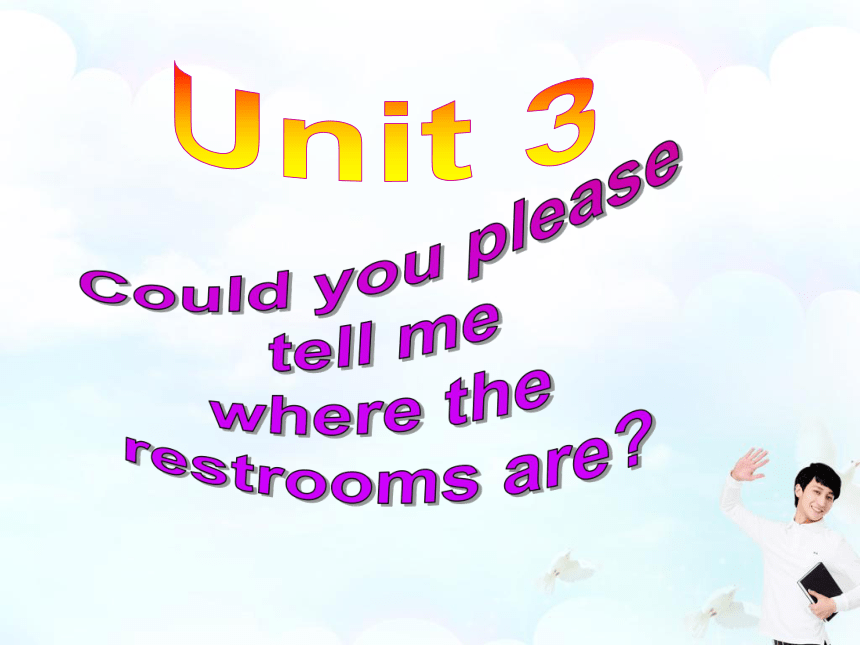 | |
| 格式 | ppt | ||
| 文件大小 | 1.6MB | ||
| 资源类型 | 教案 | ||
| 版本资源 | 人教新目标(Go for it)版 | ||
| 科目 | 英语 | ||
| 更新时间 | 2022-11-11 15:09:09 | ||
图片预览

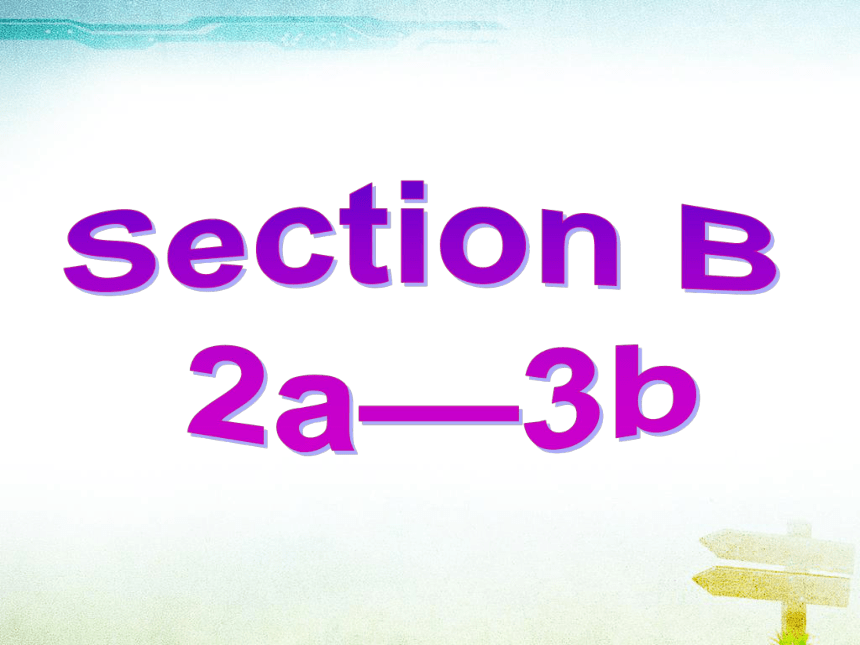


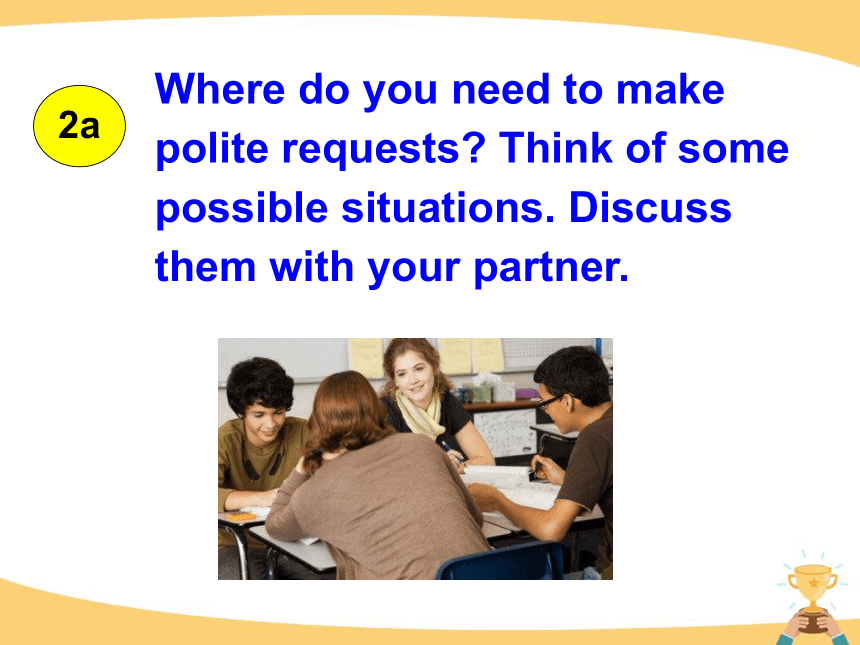
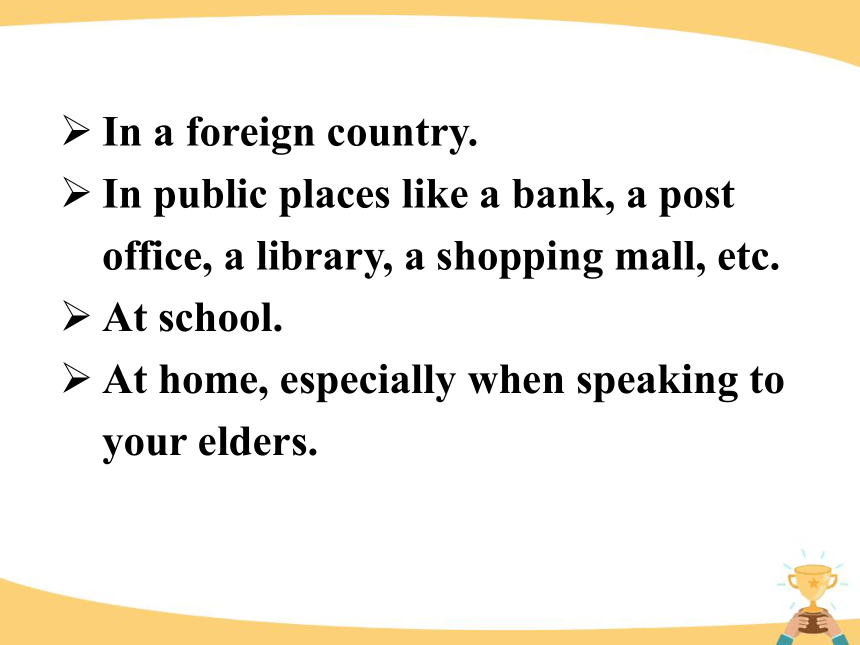

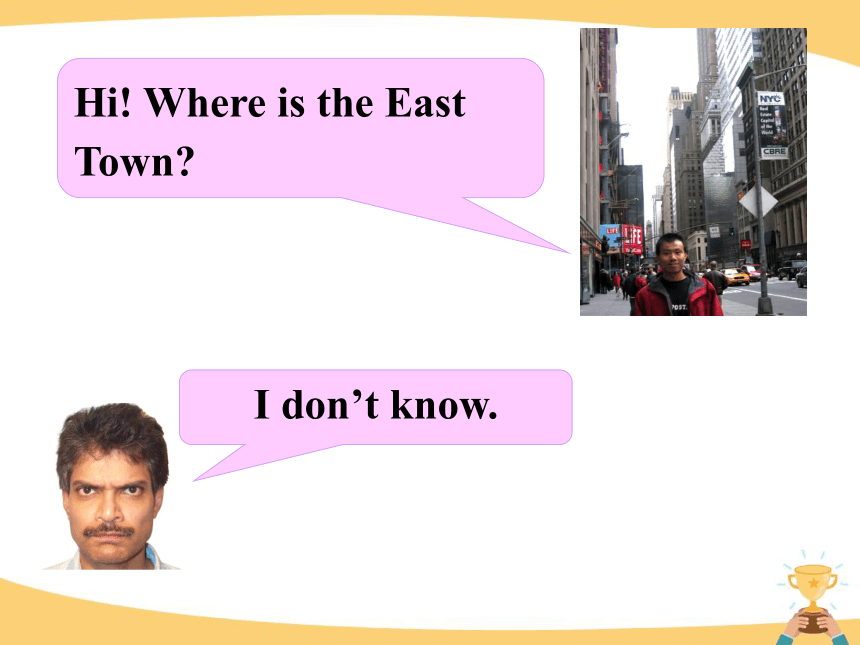
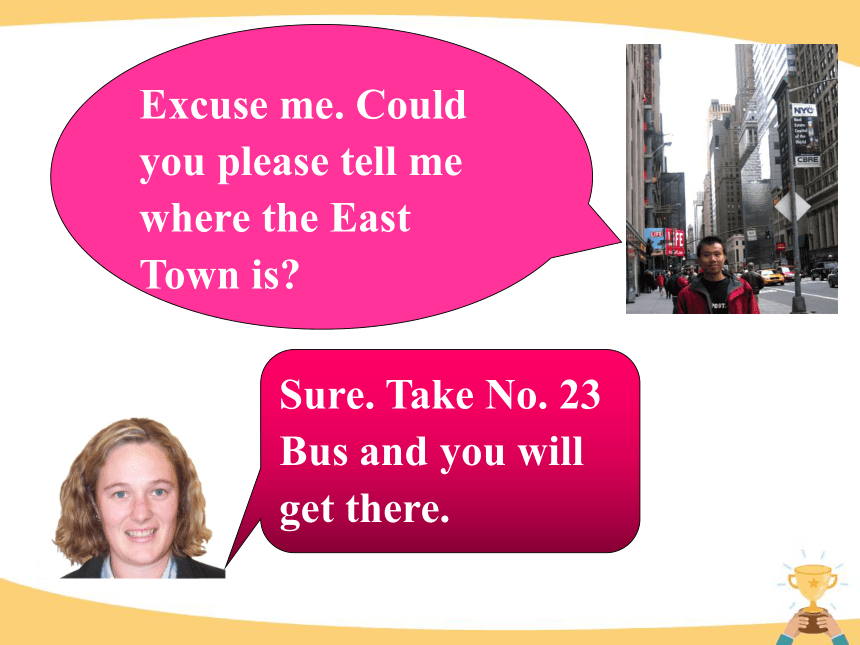
文档简介
(共28张PPT)
Sure, go east along this street, then you’ll see it.
Could you please tell me where the nearest bank is
You are a tourist in a city, you must need some help .How can you do
And do you know where the biggest hospital is
Sure. Walk along this street, the restaurant is on you right.
Can you tell me if there is a delicious restaurant near here
Go down this street, turn left at the first crossing, you will see it.
2a
Where do you need to make polite requests Think of some possible situations. Discuss them with your partner.
In a foreign country.
In public places like a bank, a post office, a library, a shopping mall, etc.
At school.
At home, especially when speaking to your elders.
Zhang Ming is traveling in the USA.
He wants to go to a small town but he doesn’t know the way now.
What should he do
Hi! Where is the East Town
I don’t know.
Excuse me. Could you please tell me where the East Town is
Sure. Take No. 23 Bus and you will get there.
反义词:impolite
adj. 不礼貌的
Read the article and underline the topic sentence for each paragraph.
2b
Paragraph 1
When you visit a foreign country, it is important to know how to ask for help politely (adv. 礼貌地) ….
polite adj. 礼貌的
Paragraph 2
Good speakers change the way they speak in different situations. …
n. 发言者
Paragraph 3
Usually polite questions are longer. They include expressions such as “Could you please … ” or “May I ask … ” It sounds more polite to say, “Peter, could you please tell me your e-mail address ”…
n. 地址
Paragraph 4
However, it is important to learn how to use the right language in different situations. …
What else do we need to learn besides asking a question correctly when you ask for help
We need to learn how to be polite when we ask for help.
Read paragraph 1 and answer the question.
What do we need to think about when you talk to different people
We need to think about whom we speak to or how well we know them.
Read paragraph 2 and answer the question.
What can lead in to a request with a stranger on the street
“Excuse me, I wonder if you can
help me” or “I’m sorry to trouble
you, but …” before asking for
help.
Read paragraph 3 and answer the question.
Find all the direct questions and polite requests from the passage.
2c
Direct questions Polite requests
Where are
the restrooms
1. Could you please tell me where the restrooms are
Direct questions Polite requests
2. When is the
school trip
3. Peter, tell me
your e-mail
address.
2. Excuse me, Mr. West.
Do you know when
the school trip is
3. Peter, could you
please tell me
your e-mail address
4. Where’s the
post office
4. Pardon me, could you please tell me where to park my car
Read the requests below. In the second column, write A if you would say it to someone you know and B if you would say it to a stranger. In the last column, write where you think these people are.
2d
Request Person Place
1. Will you pass the salt
2. Do you know where I
can change some money,
please
3. Could you tell me what
just happened
4. Can you please tell me
where the nearest station
is
A
home
B
street
A/B
any public place/home
B
street
Request Person Place
5. Excuse me, do you know
what time it begins, please
6. Let me know when you’re
ready, OK
7. Could you possibly tell me
the way to the village
school
B
movie theater
A
home
B
street
Both are correct, but the first
one sounds less polite.
less + 形容词或副词, 构成降级比较形式, 相当于中文“不那么; 稍许不……”之意。
e.g. His second movie is less
interesting.
他的第二部电影就没那么有趣。
2. It might seem more difficult to speak
politely than directly.
情态动词might 表达一种可能性及推
测的不确定性, 意思与表达可能性
的may相当, 表示“有可能, 也许
会”, 但语气更加委婉, 更不确定。
e.g. He might come, but it’s very
unlikely.
他也许会来,但非常靠不住。
3. However, it is important to learn how to use the right language in different situations.
it作形式主语
【梳理】
在英语中, 如果主语是较长的动词
不定式或一个句子, 为了保持句子
结构的平衡, 避免头重脚轻, 通常
用it作形式主语放在句首, 而把真正
的主语放在句尾。
常见的句型有:
1) It is + adj. (+ ____ + sb.) + to do sth.。常用于此句型的形容词有important, difficult, dangerous, necessary, useful, possible等, 用来对to do sth. 进行说明。如:
It’s difficult for us to finish the work in an hour.
for
2) It is + adj. + ____ + sb. + to do sth.
常用于此句型的形容词有good, kind,
nice, clever, wise等, 用来对sb.的性
格、品质等进行说明。
如:
It’s kind of you to say so.
of
请根据汉语意思完成下列英语句子(每
空一词)。
对他来说,回答那个问题是十分困难
的。
It’s very hard ____ him ____ _______
that question.
2. 你这样说真是太好了。
It’s very kind ____ you ____ ____ so.
for
to answer
of
to say
3. 我们在阅览室里保持安静是十分必
要的。
It’s necessary ______ ______
(should) keep quiet in the reading
room.
It’s necessary for us
_____ ________ ______ in the
reading room.
that we
to keep quiet
Sure, go east along this street, then you’ll see it.
Could you please tell me where the nearest bank is
You are a tourist in a city, you must need some help .How can you do
And do you know where the biggest hospital is
Sure. Walk along this street, the restaurant is on you right.
Can you tell me if there is a delicious restaurant near here
Go down this street, turn left at the first crossing, you will see it.
2a
Where do you need to make polite requests Think of some possible situations. Discuss them with your partner.
In a foreign country.
In public places like a bank, a post office, a library, a shopping mall, etc.
At school.
At home, especially when speaking to your elders.
Zhang Ming is traveling in the USA.
He wants to go to a small town but he doesn’t know the way now.
What should he do
Hi! Where is the East Town
I don’t know.
Excuse me. Could you please tell me where the East Town is
Sure. Take No. 23 Bus and you will get there.
反义词:impolite
adj. 不礼貌的
Read the article and underline the topic sentence for each paragraph.
2b
Paragraph 1
When you visit a foreign country, it is important to know how to ask for help politely (adv. 礼貌地) ….
polite adj. 礼貌的
Paragraph 2
Good speakers change the way they speak in different situations. …
n. 发言者
Paragraph 3
Usually polite questions are longer. They include expressions such as “Could you please … ” or “May I ask … ” It sounds more polite to say, “Peter, could you please tell me your e-mail address ”…
n. 地址
Paragraph 4
However, it is important to learn how to use the right language in different situations. …
What else do we need to learn besides asking a question correctly when you ask for help
We need to learn how to be polite when we ask for help.
Read paragraph 1 and answer the question.
What do we need to think about when you talk to different people
We need to think about whom we speak to or how well we know them.
Read paragraph 2 and answer the question.
What can lead in to a request with a stranger on the street
“Excuse me, I wonder if you can
help me” or “I’m sorry to trouble
you, but …” before asking for
help.
Read paragraph 3 and answer the question.
Find all the direct questions and polite requests from the passage.
2c
Direct questions Polite requests
Where are
the restrooms
1. Could you please tell me where the restrooms are
Direct questions Polite requests
2. When is the
school trip
3. Peter, tell me
your e-mail
address.
2. Excuse me, Mr. West.
Do you know when
the school trip is
3. Peter, could you
please tell me
your e-mail address
4. Where’s the
post office
4. Pardon me, could you please tell me where to park my car
Read the requests below. In the second column, write A if you would say it to someone you know and B if you would say it to a stranger. In the last column, write where you think these people are.
2d
Request Person Place
1. Will you pass the salt
2. Do you know where I
can change some money,
please
3. Could you tell me what
just happened
4. Can you please tell me
where the nearest station
is
A
home
B
street
A/B
any public place/home
B
street
Request Person Place
5. Excuse me, do you know
what time it begins, please
6. Let me know when you’re
ready, OK
7. Could you possibly tell me
the way to the village
school
B
movie theater
A
home
B
street
Both are correct, but the first
one sounds less polite.
less + 形容词或副词, 构成降级比较形式, 相当于中文“不那么; 稍许不……”之意。
e.g. His second movie is less
interesting.
他的第二部电影就没那么有趣。
2. It might seem more difficult to speak
politely than directly.
情态动词might 表达一种可能性及推
测的不确定性, 意思与表达可能性
的may相当, 表示“有可能, 也许
会”, 但语气更加委婉, 更不确定。
e.g. He might come, but it’s very
unlikely.
他也许会来,但非常靠不住。
3. However, it is important to learn how to use the right language in different situations.
it作形式主语
【梳理】
在英语中, 如果主语是较长的动词
不定式或一个句子, 为了保持句子
结构的平衡, 避免头重脚轻, 通常
用it作形式主语放在句首, 而把真正
的主语放在句尾。
常见的句型有:
1) It is + adj. (+ ____ + sb.) + to do sth.。常用于此句型的形容词有important, difficult, dangerous, necessary, useful, possible等, 用来对to do sth. 进行说明。如:
It’s difficult for us to finish the work in an hour.
for
2) It is + adj. + ____ + sb. + to do sth.
常用于此句型的形容词有good, kind,
nice, clever, wise等, 用来对sb.的性
格、品质等进行说明。
如:
It’s kind of you to say so.
of
请根据汉语意思完成下列英语句子(每
空一词)。
对他来说,回答那个问题是十分困难
的。
It’s very hard ____ him ____ _______
that question.
2. 你这样说真是太好了。
It’s very kind ____ you ____ ____ so.
for
to answer
of
to say
3. 我们在阅览室里保持安静是十分必
要的。
It’s necessary ______ ______
(should) keep quiet in the reading
room.
It’s necessary for us
_____ ________ ______ in the
reading room.
that we
to keep quiet
同课章节目录
- Unit 1 How can we become good learners.
- Section A
- Section B
- Unit 2 I think that mooncakes are delicious!
- Section A
- Section B
- Unit 3 Could you please tell me where the restroom
- Section A
- Section B
- Unit 4 I used to be afraid of the dark.
- Section A
- Section B
- Unit 5 What are the shirts made of?
- Section A
- Section B
- Review of Units 1-5
- Unit 6 When was it invented?
- Section A
- Section B
- Unit 7 Teenagers should be allowed to choose their
- Section A
- Section B
- Unit 8 It must belong to Carla.
- Section A
- Section B
- Unit 9 I like music that I can dance to.
- Section A
- Section B
- Unit 10 You're supposed to shake hands.
- Section A
- Section B
- Review of Units 6-10
- Unit 11 Sad movies make me cry.
- Section A
- Section B
- Unit 12 Life is full of the unexpected
- Section A
- Section B
- Unit 13 We're trying to save the earth!
- Section A
- Section B
- Unit 14 I remember meeting all of you in Grade 7.
- Section A
- Section B
- Review of Units 11-14
